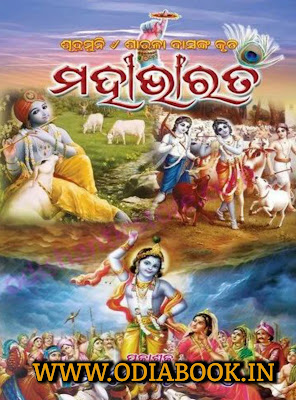Sarala Mahabharat Detail Description
Sarala Mahabharata is a famous Odia poem written by the 15th-century poet Sarala Das. It is a retelling of the Hindu epic, Mahabharata, in Odia language. Sarala Das's Mahabharata is unique in its emphasis on Lord Jagannath, the presiding deity of Puri, and in its use of local idioms and folklore.
Sarala Mahabharat Khanda
The Mahabharata by Sarala Das is divided into seven khandas (books), with a total of 13,000 couplets. The seven khandas are:
1. Adi Parva: This book introduces the main characters of the epic and sets the stage for the conflict between the Kauravas and the Pandavas.
2. Sabha Parva: This book describes the Kauravas' plan to cheat the Pandavas out of their kingdom and the events that follow.
3. Vana Parva: This book describes the Pandavas' exile in the forest and their encounters with various sages and demons.
4. Virata Parva: This book describes the Pandavas' stay in the kingdom of King Virata, where they live in disguise.
5. Udyoga Parva: This book describes the attempts by the Pandavas and the Kauravas to settle the conflict through diplomacy.
6. Bhishma Parva: This book describes the battle between the Pandavas and the Kauravas, with a focus on the role of Bhishma.
7. Swargarohana Parva: This book describes the events that follow the battle, including the death of the Pandavas and their ascension to heaven.
Sarala Mahabharata is notable for its use of simple and colloquial language, which made it accessible to a wider audience. The text also includes local elements of Odia culture and folklore, such as the worship of Lord Jagannath and the story of the demon king Kansa. Overall, the Mahabharata by Sarala Das is an important work in Odia literature and a significant contribution to the retelling of the epic in a regional language.
Sarala Mahabharata is also notable for its unique interpretation of certain characters and events in the Mahabharata story. For example, in Sarala Mahabharata, the character of Karna is portrayed as a noble and virtuous warrior, rather than the tragic hero that he is often portrayed as in other versions of the Mahabharata. The text also emphasizes the role of Lord Jagannath, who is seen as a divine protector of the Pandavas and a symbol of unity and harmony.
You May Like:
Another unique aspect of Sarala Mahabharata is its depiction of the demon king Kansa, who is typically associated with the story of Lord Krishna in Hindu mythology. In Sarala Mahabharata, Kansa is portrayed as an antagonist who is ultimately defeated by the Pandavas. This reinterpretation of the Kansa story is an example of Sarala Das's use of local folklore and mythology to enrich the narrative of the Mahabharata.
Sarala Mahabharata has been translated into several languages, including English, and has been studied by scholars of literature and history. The poem has also had a significant impact on Odia culture and has helped to popularize the language and literature of the region. Today, Sarala Mahabharata is regarded as one of the greatest works of Odia literature and a testament to the rich cultural heritage of Odisha.
In addition to its literary significance, Sarala Mahabharata has also played an important role in the religious and cultural life of Odisha. The text is closely associated with the worship of Lord Jagannath, who is considered to be the divine protector of the Odia people. The annual Rath Yatra festival, which celebrates the journey of Lord Jagannath from his temple in Puri to his summer home, features readings from the Sarala Mahabharata as part of the festivities.
Sarala Mahabharata has also been adapted into various forms of performing arts in Odisha, including theater, dance, and music. The text has inspired numerous plays, operas, and dance dramas, which have helped to keep the story of the Mahabharata alive in the popular imagination.
Sarala Das's contribution to Odia literature extends beyond his retelling of the Mahabharata. He was also a prolific writer of poetry, devotional literature, and other works of prose. His works are characterized by their simplicity, clarity, and emphasis on moral and ethical values.
Overall, Sarala Mahabharata is an important cultural and literary work that has had a profound impact on the people of Odisha and beyond. It is a testament to the enduring appeal of the Mahabharata story and a tribute to the creative genius of Sarala Das, who brought the epic to life in a regional language and enriched it with the folklore and culture of Odisha.


